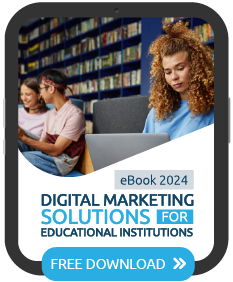If you post to your college or university’s blog to engage prospective students then you know how difficult it can be to regularly and repeatedly come up with interesting and relevant topics to write about. Staring at that blank page on the screen with a rapidly approaching deadline is an awful feeling. But rest assured, there are some strategies you can use to make the task a bit easier, improve the relevance of what you write and even more importantly, help you meet the marketing objectives you are writing for in the first place.
When you are creating content for your blog you have two very important audiences to keep in mind, the prospective student and the search engine spider. For the student, you want to create engaging, relevant content that will be of interest, and use, to your target audience so that they will take notice of your school, want to learn more about it and hopefully, consider attending. For the search engine spider, you want to create relevant, keyword-rich documents that will increase your organic ranking for your priority short and long-tail keyword phrases, therefore increasing the likely number of prospective student visitors to your website who are searching on those keywords.
1) Here are two strategies to help tackle the first objective of creating high quality content targeted at your student audience.
a) Break down your total audience into customer personas and create customized content for each of them. Customer personas are “fictional characters created to represent the different user types within a targeted demographic, attitude and/or behavior set that might use a site, brand or product in a similar way.” (Wikipedia)
Here’s an example of a student persona:  With this type of detailed persona of a hypothetical student in hand, it’s much easier to identify unique topics that this “individual” will find interesting and useful. Brainstorm to generate topics based on their demographic characteristics and psychographic needs and develop your content for them, in as direct, and as personal a way as you can.
With this type of detailed persona of a hypothetical student in hand, it’s much easier to identify unique topics that this “individual” will find interesting and useful. Brainstorm to generate topics based on their demographic characteristics and psychographic needs and develop your content for them, in as direct, and as personal a way as you can.
b) Create content that is targeted at individuals at the multiple entry points of your recruitment funnel. Select topics and generate content that is targeted at the interests and needs of individuals entering your recruitment funnel at its different entry points, i.e., information package request, open house, campus tour, etc.
For example, create a blog post with copy, pictures and visiting student’s comments, describing in detail the most interesting stop on your campus tour. Target topics, places and things that a prospective student at the tipping point of entering your recruitment funnel can relate to. Try and mentally step into their shoes and ask yourself what questions they have in their minds at that moment and write about it. In the graphic below you can see some examples of how different formats for content might be applied to address the changing requirements of a prospective student, as they move through their “buying cycle”.  Source: www.sigmawebmarketing.com
Source: www.sigmawebmarketing.com
2) Now let’s consider strategies for identifying topics for content development motivated by our search engine optimization priorities. a) Configure Google Analytics to track your internal site search and identify the most common queries that visitors make when inside your site. This list of search topics is an excellent place to start writing about. It provides value to your visitors by creating content that pre-empts their need to go any further looking for information and beefs up your SEO for these key topics all at the same time. b) Use the Google Adwords Tool to identify topics related to your main targeted keywords that have the most traffic volume and then write about them. Adword’s Keyword Tool will also provide an almost endless list of variations on keywords, providing you with suggestions for related phrases that can be great inspiration for a new angle or new approach to a priority topic that you want to write about.  c) Use Q and A sites like LinkedIn Answers or Quora to see what kinds of questions are being asked about the topics that relate most directly to your type of programs and start to write about them. When you create your website content you should always write first and foremost for your target audience, human that is. Don’t try to write specifically for SEO because it will sound like it and be ineffective on both sides of the fence. Use the optimization strategies we have talked about here to focus your editorial plan on the best topics, and and your SEO rankings will take care of themselves.
c) Use Q and A sites like LinkedIn Answers or Quora to see what kinds of questions are being asked about the topics that relate most directly to your type of programs and start to write about them. When you create your website content you should always write first and foremost for your target audience, human that is. Don’t try to write specifically for SEO because it will sound like it and be ineffective on both sides of the fence. Use the optimization strategies we have talked about here to focus your editorial plan on the best topics, and and your SEO rankings will take care of themselves.
What other strategies do you use to generate ideas for your posts? What works the best for you? Please pass along your ideas and we’ll certainly share them with all of our other readers.





